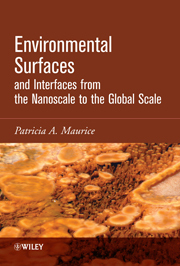
Patricia A. Maurice, associate dean of engineering research and professor of civil engineering and geological sciences at the University of Notre Dame, is the author of a new book titled “Environmental Surfaces and Interfaces from the Nanoscale to the Global Scale.” The book, recently published by Wiley, offers an advanced analysis of water-rock interactions.
In the comprehensive study, Maurice explores topics from the theory of charged particle surfaces to how minerals grow and dissolve, from the concept that plants and microorganisms are environmental surfaces to environmental nanoscience and climate change.
“Surfaces and interfaces — whether they occur, for example, between mineral nanoparticles and water or bacteria and soil minerals — play significant roles in the environment,” Maurice said. “Only by understanding the fundamental science and engineering aspects of nanoparticle, microbial and other surfaces, can we understand how nutrients cycle through soils, how pollutants migrate through contaminated sites or how new nanomaterials released to the environment might impact both ecosystems and humans.”
Although it is written for advanced undergraduate and graduate students studying geochemistry and soil chemistry, “Environmental Surfaces” encompasses a broad range of disciplines and will serve such diverse fields as biology, environmental chemistry, environmental engineering, hydrogeology and physics. The textbook is based on lectures developed for Maurice’s environmental geosciences course on water-rock interactions.
A Notre Dame faculty member since 2000, Maurice studies microbial, trace metal and organic interactions with mineral surfaces from the atomic scale up to the scale of entire watersheds, such as the Lake Erie basin or portions of the Atlantic Coastal Plain.
She also examines how extreme climates affect ecosystems. Her research encompasses the hydrology and biochemistry of freshwater wetlands and mineral-water interactions, the remediation of metal contamination and global climate change.
Maurice is a member of the American Geophysical Union, Geochemical Society, Mineralogical Society of America, Clay Minerals Society and American Chemical Society.
She earned her bachelor’s degree in earth and planetary sciences from Johns Hopkins University, her master’s in geophysics from Dartmouth College and her doctorate in aqueous and surface geochemistry and applied earth sciences from Stanford University.
Contact: Patricia Maurice, 574-631-3469, maurice.3@nd.edu